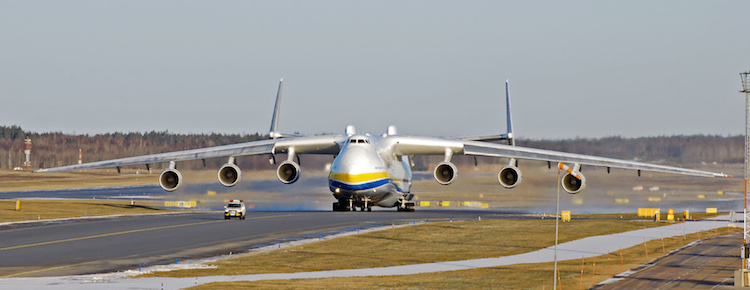
British car manufacturer Bentley has announced it will utilise five Antonov cargo aircraft to help it overcome the potential supply bottleneck caused by a chaotic exit of Britain from the European Union.
Bentley sources most of its supplies from continental Europe, and sells about 24 per cent of its cars into Europe, CEO Adrian Hallmark said at the Financial Times Future of the Car summit.
“We have spent two years planning. We have five Antonovs that we have on reserve to fly bodies to Manchester,” Hallmark said.
Bentley has not released any further details into where it is sourcing the aircraft, or other specifics on the arrangement.
The comments come in light of ongoing negotiations between the European Union and the UK as to what the European aerospace environment will look like following the UK’s official exit from the EU.
To date, little has been achieved.
As such, Bentley, as all businesses and manufacturers that work between the UK and EU, has had to make contingency plans.
In addition to shifting car bodies by air, Bentley has increased the level of spare parts stored for production, booked additional warehouses and planned new logistics routes in case traditional supply methods are hampered by bottlenecks.
If Britain fails to secure a negotiated trade agreement with EU policymakers, Bentley has said would be able to absorb 10 percent import tariffs by raising prices and cutting costs. This would be less damaging than supply disruptions.
“It is not existential as long as everything flows. Stopping flows is far more dangerous than Brexit tariffs,” Hallmark said, referring to supply bottlenecks.
Last month, UK aviation authorities claimed to be working hard to mitigate the potential risks faced by the country’s aviation sector once the current Brexit transition period with the European Union ends on 31 December.
From 1 January 2021, the UK Civil Aviation Authority (CAA) will be required to take on new regulatory responsibilities, as Britain will no longer form as a member of the European air safety regulator, EASA.
“I can reassure you that we are extremely active in doing all that we can to mitigate those risks,” CAA chairman Sir Stephen Hillier said.
“We have recruited the additional people we need.”
To date, the UK has already made bilateral travel agreements with a number of countries, including Canada, the US, Israel, Norway and Switzerland, and has even acquired traffic rights in a number of agreements to which the EU is not party.
However, a failure to reach an appropriate new agreement, or introduce temporary contingency measures, could wreak havoc on both the UK and EU aviation sectors, growing UK-EU flights, and cause further harm to the already weakened aviation sector in the region, according to Fitch Ratings.
“Airlines with high exposure to or from the UK, such as British Airways (BA) and easyJet, are at higher risk from uncertainties over connectivity arrangements. In 2019, around 50 per cent of BA’s passengers travelled to and from the European economic area,” the Fitch Ratings report said.
“EU-based carriers, especially those low-cost carriers (LCCs) whose operations are largely reliant on intra-European traffic, would also be affected, albeit to a lesser extent.”
Airports across the UK and EU would also take a hit to revenue should no deal be struck between the two parties, though Heathrow has reportedly already taken strides to increase liquidity in the event that such an event should take place.
While the failure to come to an agreement over ongoing aviation operations would have a “significant impact” on both the UK and the EU, Fitch anticipates that some agreement, temporary or long term, will be made prior to the 31 December deadline.
“We expect the counterparties in Brexit negotiations to secure continuation of basic connectivity followed by a long-term agreement,” it said.
Any temporary agreement is likely not to be struck until the 11th hour, however, and the EU has made it clear that it will not make the process of leaving an easy one for the UK.













